Abstract
This study determined the incidence and concentration of methane-producing bacteria in tap water enema samples of 130 individuals taken before sigmoidoscopy. The number of subjects classified in five major colonic groups were as follows: normal colon 36, diverticulosis 57, inflammatory bowel disease 11, colon polyps 34, and colon cancer 11. Some patients were placed in more than one category. Ninety four of the subjects or 72% had methanogenic bacteria ranging in concentration from 6 to about 3 X 10(10)/g dry weight of faeces. The predominant methanogen in all groups was Methanobrevibacter smithii. Chi-square analysis showed that the incidence of methanogens in concentrations of 10(7)/g dry weight of faeces or greater in patients with diverticulosis (58%) was significantly greater than in normal patients (25%). High methanogen concentrations are associated with excretion of methane in the breath.
Full text
PDF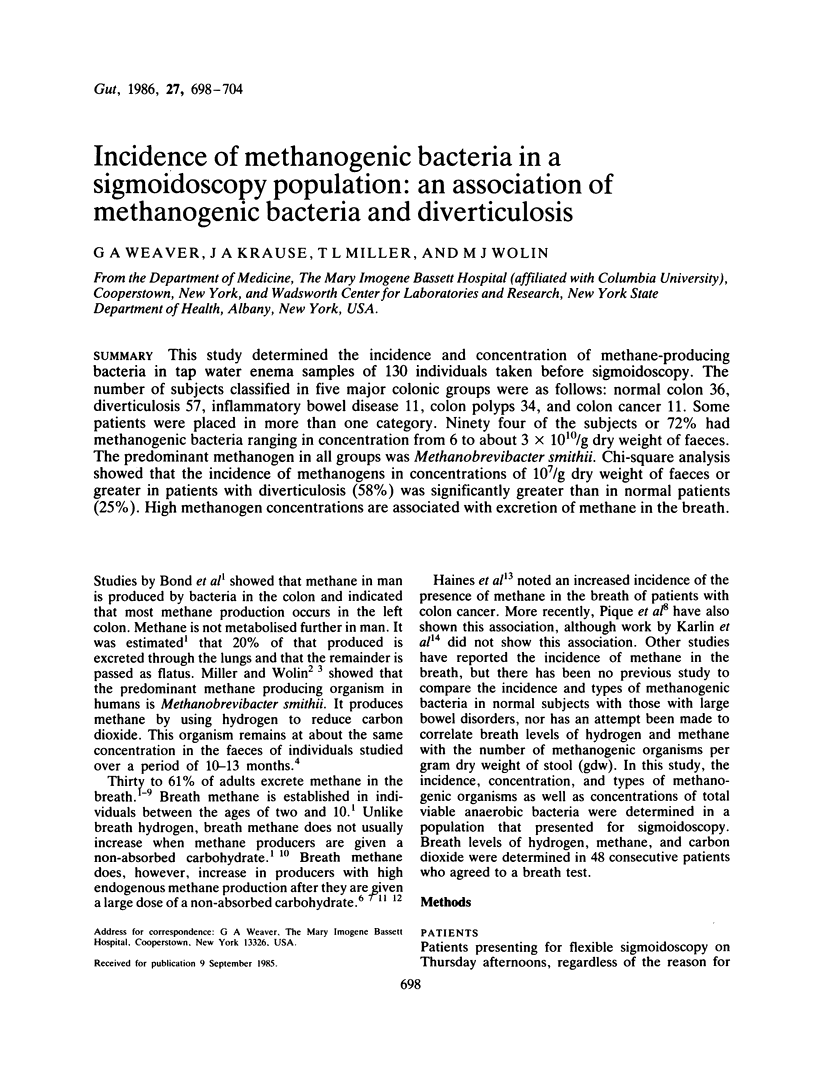
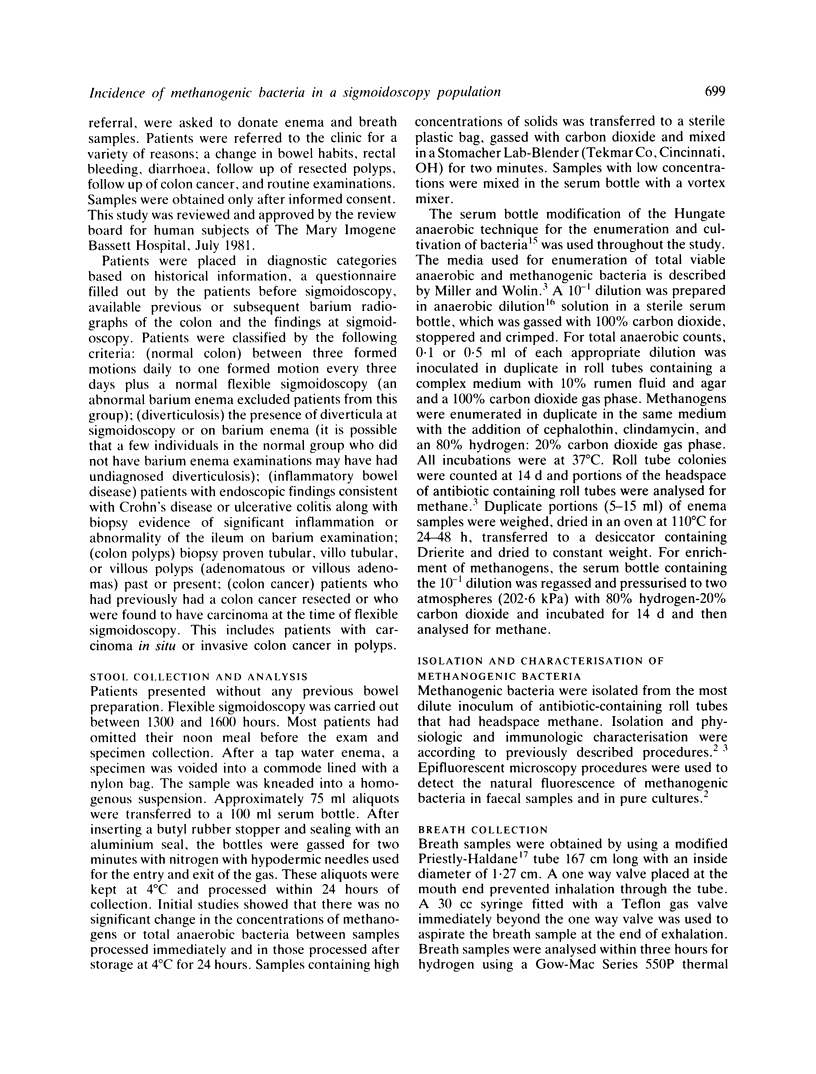
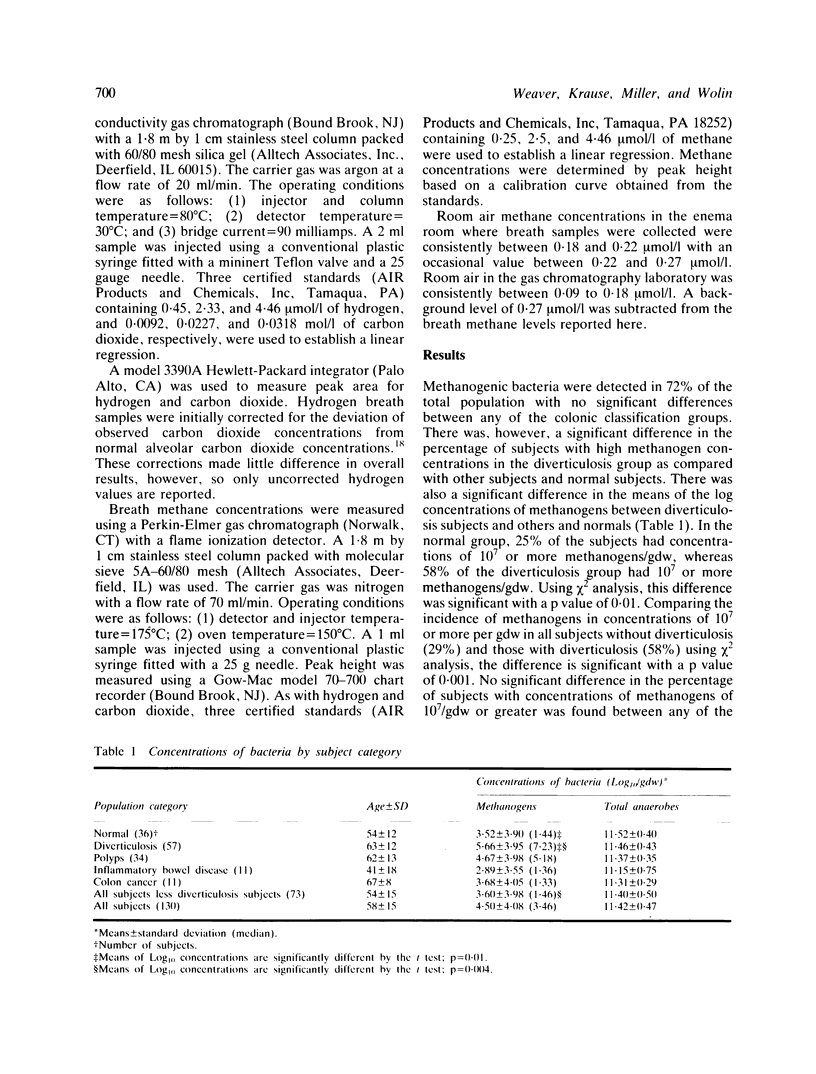
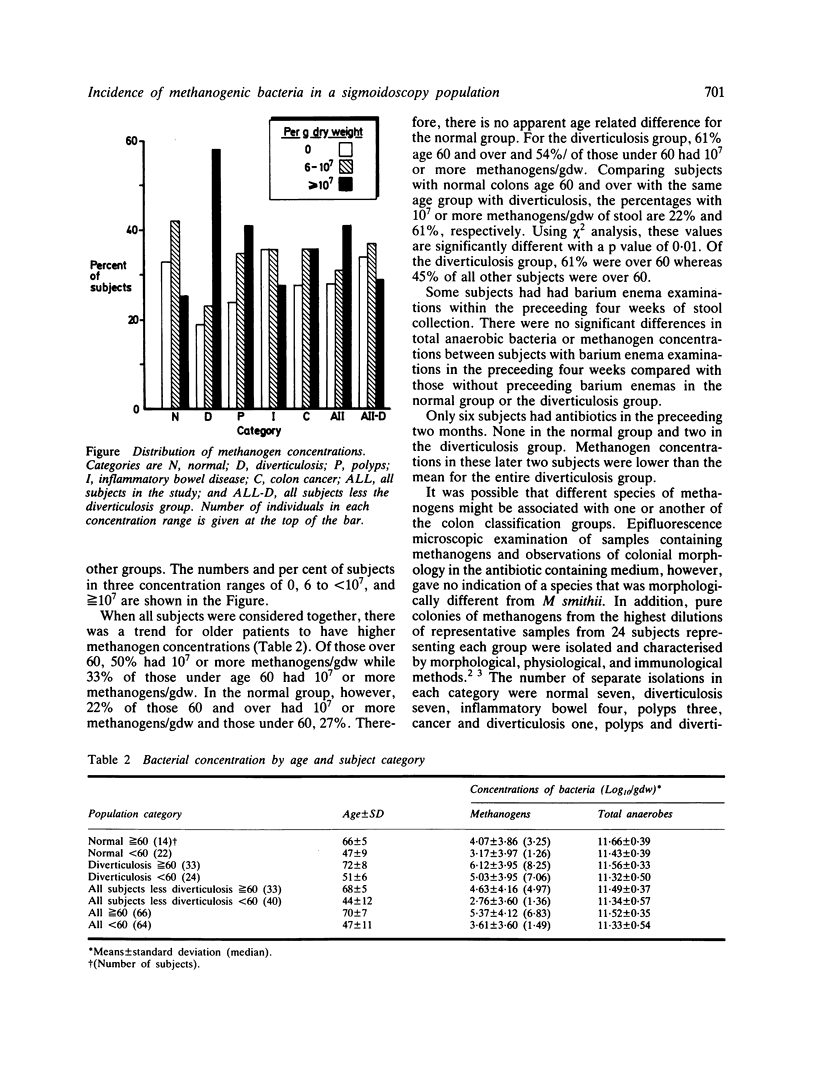
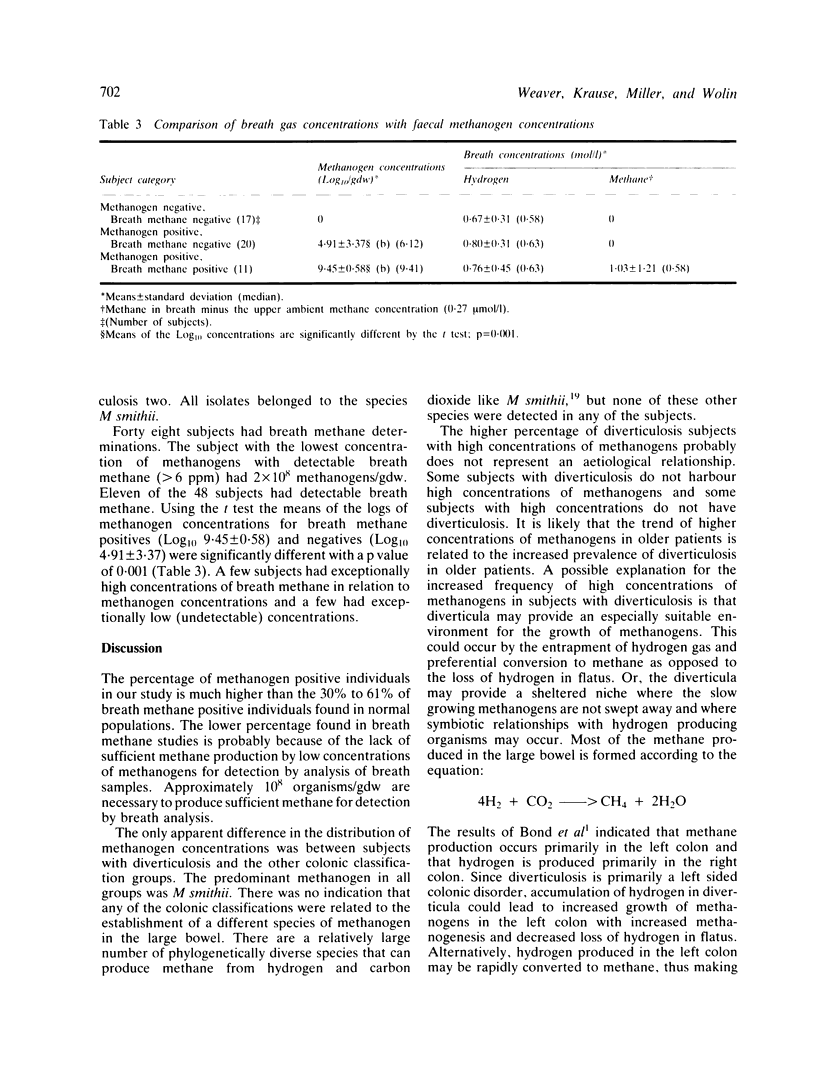
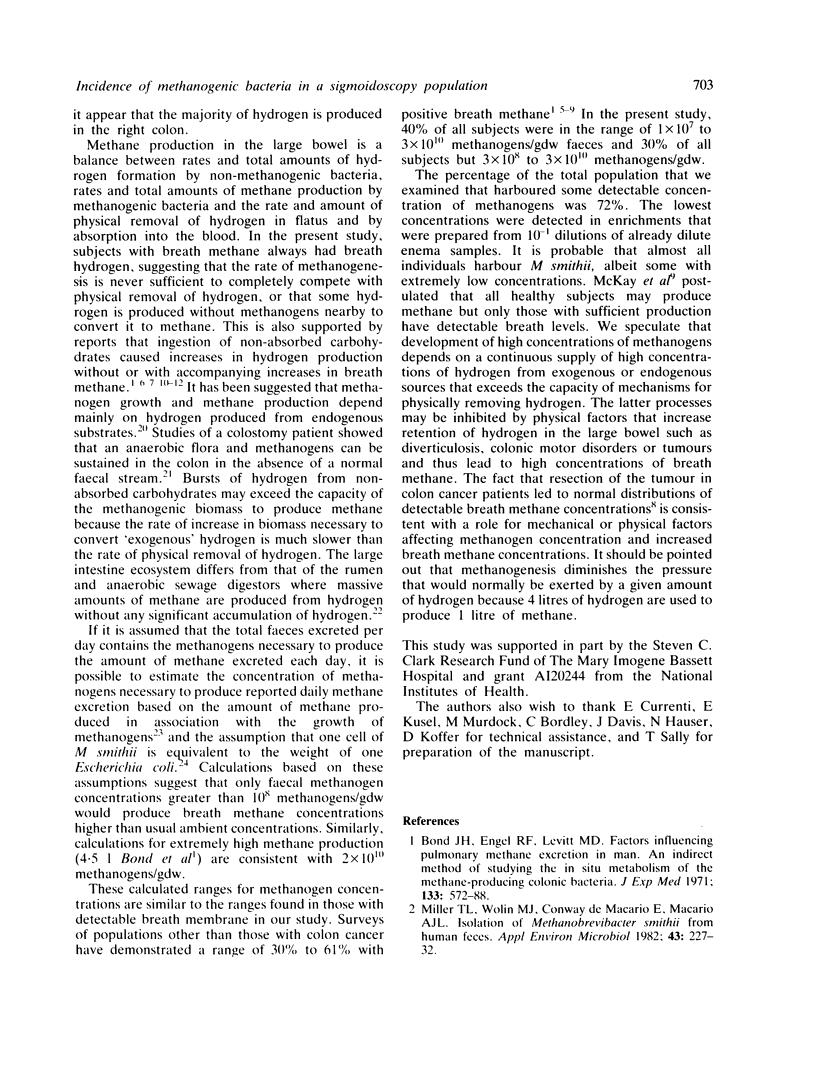

Selected References
These references are in PubMed. This may not be the complete list of references from this article.
- Balch W. E., Fox G. E., Magrum L. J., Woese C. R., Wolfe R. S. Methanogens: reevaluation of a unique biological group. Microbiol Rev. 1979 Jun;43(2):260–296. doi: 10.1128/mr.43.2.260-296.1979. [DOI] [PMC free article] [PubMed] [Google Scholar]
- Beaven J., Bjørneklett A., Jenssen E., Blomhoff J. P., Skrede S. Pulmonary hydrogen and methane and plasma ammonia after the administration of lactulose or sorbitol. Scand J Gastroenterol. 1983 May;18(3):343–347. doi: 10.3109/00365528309181604. [DOI] [PubMed] [Google Scholar]
- Bjørneklett A., Jenssen E. Relationships between hydrogen (H2) and methane (CH4) production in man. Scand J Gastroenterol. 1982 Nov;17(8):985–992. [PubMed] [Google Scholar]
- Bond J. H., Jr, Engel R. R., Levitt M. D. Factors influencing pulmonary methane excretion in man. An indirect method of studying the in situ metabolism of the methane-producing colonic bacteria. J Exp Med. 1971 Mar 1;133(3):572–588. doi: 10.1084/jem.133.3.572. [DOI] [PMC free article] [PubMed] [Google Scholar]
- Daniels L., Sparling R., Sprott G. D. The bioenergetics of methanogenesis. Biochim Biophys Acta. 1984 Sep 6;768(2):113–163. doi: 10.1016/0304-4173(84)90002-8. [DOI] [PubMed] [Google Scholar]
- Haines A., Metz G., Dilawari J., Blendis L., Wiggins H. Breath-methane in patients with cancer of the large bowel. Lancet. 1977 Sep 3;2(8036):481–483. doi: 10.1016/s0140-6736(77)91605-1. [DOI] [PubMed] [Google Scholar]
- Karlin D. A., Jones R. D., Stroehlein J. R., Mastromarino A. J., Potter G. D. Breath methane excretion in patients with unresected colorectal cancer. J Natl Cancer Inst. 1982 Sep;69(3):573–576. [PubMed] [Google Scholar]
- Marthinsen D., Fleming S. E. Excretion of breath and flatus gases by humans consuming high-fiber diets. J Nutr. 1982 Jun;112(6):1133–1143. doi: 10.1093/jn/112.6.1133. [DOI] [PubMed] [Google Scholar]
- McKay L. F., Brydon W. G., Eastwood M. A., Smith J. H. The influence of pentose on breath methane. Am J Clin Nutr. 1981 Dec;34(12):2728–2733. doi: 10.1093/ajcn/34.12.2728. [DOI] [PubMed] [Google Scholar]
- McKay L. F., Eastwood M. A., Brydon W. G. Methane excretion in man--a study of breath, flatus, and faeces. Gut. 1985 Jan;26(1):69–74. doi: 10.1136/gut.26.1.69. [DOI] [PMC free article] [PubMed] [Google Scholar]
- Metz G., Gassull M. A., Leeds A. R., Blendis L. M., Jenkins D. J. A simple method of measuring breath hydrogen in carbohydrate malabsorption by end-expiratory sampling. Clin Sci Mol Med. 1976 Mar;50(3):237–240. doi: 10.1042/cs0500237. [DOI] [PubMed] [Google Scholar]
- Miller T. L., Weaver G. A., Wolin M. J. Methanogens and anaerobes in a colon segment isolated from the normal fecal stream. Appl Environ Microbiol. 1984 Aug;48(2):449–450. doi: 10.1128/aem.48.2.449-450.1984. [DOI] [PMC free article] [PubMed] [Google Scholar]
- Miller T. L., Wolin M. J., Conway de Macario E., Macario A. J. Isolation of Methanobrevibacter smithii from human feces. Appl Environ Microbiol. 1982 Jan;43(1):227–232. doi: 10.1128/aem.43.1.227-232.1982. [DOI] [PMC free article] [PubMed] [Google Scholar]
- Miller T. L., Wolin M. J. Enumeration of Methanobrevibacter smithii in human feces. Arch Microbiol. 1982 Feb;131(1):14–18. doi: 10.1007/BF00451492. [DOI] [PubMed] [Google Scholar]
- Miller T. L., Wolin M. J. Stability of Methanobrevibacter smithii populations in the microbial flora excreted from the human large bowel. Appl Environ Microbiol. 1983 Jan;45(1):317–318. doi: 10.1128/aem.45.1.317-318.1983. [DOI] [PMC free article] [PubMed] [Google Scholar]
- Niu H. C., Schoeller D. A., Klein P. D. Improved gas chromatographic quantitation of breath hydrogen by normalization to respiratory carbon dioxide. J Lab Clin Med. 1979 Nov;94(5):755–763. [PubMed] [Google Scholar]
- Piqué J. M., Pallarés M., Cusó E., Vilar-Bonet J., Gassull M. A. Methane production and colon cancer. Gastroenterology. 1984 Sep;87(3):601–605. [PubMed] [Google Scholar]
- Pitt P., de Bruijn K. M., Beeching M. F., Goldberg E., Blendis L. M. Studies on breath methane: the effect of ethnic origins and lactulose. Gut. 1980 Nov;21(11):951–954. doi: 10.1136/gut.21.11.951. [DOI] [PMC free article] [PubMed] [Google Scholar]
- Tadesse K., Eastwood M. A. Metabolism of dietary fibre components in man assessed by breath hydrogen and methane. Br J Nutr. 1978 Sep;40(2):393–396. doi: 10.1079/bjn19780136. [DOI] [PubMed] [Google Scholar]
- Wolin M. J. Fermentation in the rumen and human large intestine. Science. 1981 Sep 25;213(4515):1463–1468. doi: 10.1126/science.7280665. [DOI] [PubMed] [Google Scholar]


